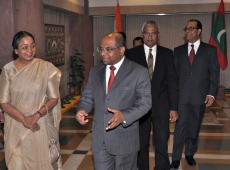The new Indian High Commissioner to the Maldives Rajeev Shahare has emphasised the “unshakable” long-standing relationship between between both countries during a meeting with local media yesterday (April 10).
The new commissioner, who speaks fluent Arabic, previously served in Saudi Arabia, Bahrain, Egypt, Yemen, Geneva, Mauritius, as well as held the position of Joint Secretary in the Indian Ministry of External Affairs’, West Asia North Africa division.
Shahare presented his credentials to President Mohamed Waheed Hassan Manik yesterday morning, before later discussing his initial observations on the country with local media.
“It is a great honour and privilege to represent the government of India in a country such as the Maldives. With its azure blue and turquoise water, this is a phenomenal God-gifted country,” he stated during yesterday’s media event.
“During my tenure, I will endeavor to further strengthen the relationship between India and the Maldives, which is already very strong with an unshakable foundation.”
“Highs and lows”
Shahare also stressed there had been no change in the relationship between the Maldives and India, despite media reports of increased tension between both nations in recent months.
“In any relationship there are highs and lows, but the relationship carries on its course normally,” he said.
“Engagement between the Maldives and India has been constant. We are pretty much on course.”
Shahare emphasised that the Maldives held a “special place in the hearts of Indians” given the deep historical ties, common language and ethnic background the countries share.
“India is home for many Maldivians, we share a strong ethnic affinity,” he said.
He claimed that India would continue to support the Maldives and provide for the country’s needs when requested.
“India has always been there for the Maldives. It is in a state of readiness to provide whatever the Maldives requires,” Shahare stated.
Shahare also thanked the Maldivian government for arranging the ceremony “in record time”, praising local authorities for their “magnanimity” in allowing him to meet senior government officials prior to presenting his credentials to the president.
Shahare has replaced former Indian High Commissioner D M Mulay, who left the Maldives last month to take the position as India’s Consul in New York.
Earlier this week, Mulay told the Times of India publication: “there is no expert on the Maldives in India and awareness regarding the country and its geopolitical situation is very low.”
He also emphasised the importance of understanding Maldivian political, economic and social changes which “may have a major impact on India”.
Referring to the large number of Chinese tourists outstripping Indian visits to the Maldives, Mulay stressed that “One must be aware about the clout of a country from which there is such a big tourist inflow”.
Mulay also discussed the “commensurate increase in the points of connectivity between the two countries”, adding that Indian investments in the Maldives are increasing.
Diplomatic strain
The Maldives’ relationship with India has appeared strained since the Waheed government’s decision last November to evict Indian infrastructure giant GMR from the country with seven days notice.
The US$511 concession agreement to develop Ibrahim Nasir International Airport was declared ‘void from the start’.
The government’s sudden eviction of the Indian investor did not appear on a list of 11 grievances handed to all senior Maldivian reporters by the Indian High Commission this January.
The list of Consular issues affecting the India-Maldives relationship included a number of concerns: discrimination against Indian expatriates, the keeping of passports of Indian nationals by employers, exploitation of Indian workers and repatriation of mortal remains. Threats towards the country’s diplomats, a disparity in visa charges between the two countries and the repatriation of salaries were also raised as issues.
The list’s release was followed by the Indian High Commission issuing a statement in early February slamming local media in the Maldives for “misrepresentation and twisting of issues”.
“The High Commission has noted a recent trend in a section of local media to publish negative, unsubstantiated reports, while blacking out objective and positive news on Indian issues,” the Commission said at the time.
Shortly thereafter, political parties supporting the current government of President Mohamed Waheed Hassan criticised the Indian High Commission for allowing former President Mohamed Nasheed to seek refuge inside its protected diplomatic territory for 11 days.
The Adhaalath Party (AP) later condemned the Indian High Commission and the Indian government “for assisting a criminal fleeing from trial”.
The AP was also a vocal opponent of GMR and the concession agreement signed by the previous government to develop Ibrahim Nasir International Airport. During one of the party’s rallies last year, several senior government figures mocked and insulted the former Indian High Commissioner D M Mulay calling him a “traitor to the Maldives”.
Home Minister Mohamed Jameel Ahmed also expressed his disappointment over the Indian government’s decision to provide refuge to Nasheed in the Indian High Commission. He said that attempts by any country to prevent a person from facing charges pressed by an independent Prosecutor General (PG), could be described as interfering domestic matters of a sovereign state, local media reported.
Following Nasheed’s exit from the High Commission and subsequent arrest on March 5, Indian Prime Minister Manmohan Singh highlighted “free, fair and credible” elections as the “best course” for overcoming political uncertainty in the Maldives.
Likes (0)Dislikes
(0)Dislikes (0)
(0) 